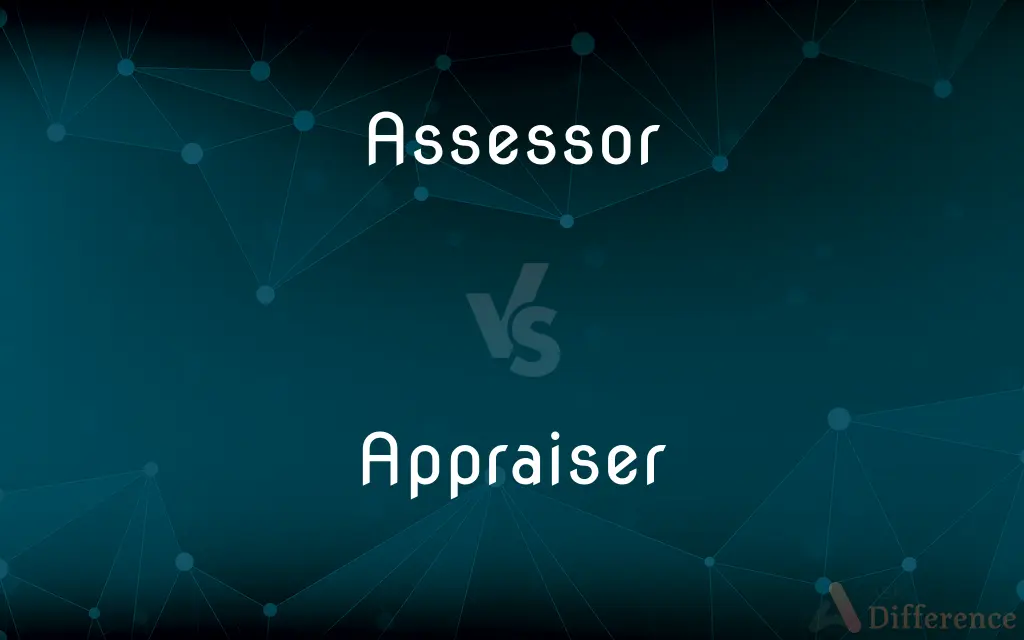Assessor vs. Appraiser — What's the Difference?
By Fiza Rafique & Maham Liaqat — Updated on March 16, 2024
An assessor estimates property values for tax purposes, focusing on mass valuation, while an appraiser provides detailed valuations for specific properties, often for sales, insurance, or financing.

Difference Between Assessor and Appraiser
Table of Contents
ADVERTISEMENT
Key Differences
Assessors are primarily involved in estimating the value of properties within a particular jurisdiction for the purpose of taxation. They use mass appraisal techniques to value a large number of properties simultaneously. On the other hand, appraisers focus on individual property evaluations, offering detailed assessments for transactions like sales, refinancing, or insurance purposes.
While assessors work for governmental bodies and their valuations are used to determine property taxes, appraisers can be either independent professionals or work for specific firms. Their assessments are often utilized in real estate transactions, loan underwriting, and investment analysis. Appraisers typically provide their services to private clients, financial institutions, and legal entities.
Assessors rely on broad data and trends within a community to assign values, using general methodologies that apply to multiple properties. Appraisers, however, conduct thorough investigations of a property's condition, market value, and comparables to provide a more precise valuation.
The training and certification requirements for assessors and appraisers can differ significantly. Assessors often need to understand local tax laws and valuation methodologies suitable for large-scale assessments. Appraisers, in contrast, usually require more extensive education in property valuation and might need to adhere to national or international valuation standards.
Despite their different roles, both assessors and appraisers contribute essential information to the real estate market. Assessors help ensure equitable taxation based on property values, while appraisers provide the detailed analyses necessary for informed property transactions and financing decisions.
ADVERTISEMENT
Comparison Chart
Purpose
Estimate property values for taxation
Provide detailed property valuations for various purposes
Clientele
Governmental bodies
Private clients, financial institutions, legal entities
Methodology
Mass appraisal techniques
Individual, detailed property evaluations
Focus
Broad property valuation within a jurisdiction
Specific property valuation for transactions or financing
Training and Certification
Understanding of local tax laws, less extensive valuation training
Extensive education in property valuation, adherence to standards
Compare with Definitions
Assessor
Their work impacts public revenue and services.
Accurate assessments by the assessor ensure fair funding for local schools.
Appraiser
An appraiser conducts detailed valuations for specific properties.
The appraiser's report was crucial for finalizing the mortgage terms.
Assessor
An assessor determines property values for tax assessment purposes.
The county assessor updated the property tax roll based on current market values.
Appraiser
They serve a diverse clientele for various purposes.
An appraiser assessed the building's value for insurance coverage adjustments.
Assessor
They employ mass appraisal methods for efficiency.
The assessor's office uses statistical models to assess neighborhood properties.
Appraiser
Their expertise aids in financing and investment decisions.
The commercial property appraisal helped the investor decide on the purchase.
Assessor
Assessors work within governmental frameworks.
The city assessor plays a key role in setting municipal property tax rates.
Appraiser
Appraisers provide essential information for real estate transactions.
Before the sale, the appraiser determined the fair market value of the home.
Assessor
Assessors need to be familiar with local real estate markets.
The assessor attended the town hall meeting to discuss property value trends.
Appraiser
Appraisers must adhere to professional valuation standards.
The appraiser followed the Uniform Standards of Professional Appraisal Practice in her report.
Assessor
An official who evaluates property for taxation.
Appraiser
An appraiser (from Latin appretiare, "to value"), is a person that develops an opinion of the market value or other value of a product, most notably real estate. The current definition of "appraiser" according to the Uniform Standards of Professional Appraisal Practice (USPAP) is: "One who is expected to perform valuation services competently and in a manner that is independent, impartial and objective." USPAP further comments on this definition: "Such expectation occurs when individuals, either by choice or by requirement placed upon them or upon the service they provide by law, regulation, or agreement with the client or intended users, represent that they comply." To be a real property appraiser in the United States, an individual must be licensed as an appraiser by the state in which they practice.
Assessor
An assistant to a judge or magistrate, usually selected for special knowledge in a particular area.
Appraiser
To estimate the price or value of
Appraise a diamond.
Appraise real estate.
Assessor
One who assesses a property for tax or insurance evaluation.
Appraiser
To make a considered judgment about; assess or size up
Appraise a threat.
Appraised himself in the mirror.
Assessor
(law) A specialist who assists the court in determining a matter.
Appraiser
One who performs appraisals.
Assessor
A civil servant entrusted with checking the veracity of data and criteria used by a taxpayer to complete a tax return.
Tax assessor
Appraiser
One who appraises; esp., a person appointed and sworn to estimate and fix the value of goods or estates.
Assessor
One who assesses a project for cost evaluation.
Appraiser
One who estimates officially the worth or value or quality of things
Assessor
An official responsible for student welfare.
Appraiser
One who determines authenticity (as of works of art) or who guarantees validity
Assessor
One appointed or elected to assist a judge or magistrate with his special knowledge of the subject to be decided; as legal assessors, nautical assessors.
Assessor
One who sits by another, as next in dignity, or as an assistant and adviser; an associate in office.
Whence to his Son,The assessor of his throne, he thus began.
With his ignorance, his inclinations, and his fancy, as his assessors in judgment.
Assessor
One appointed to assess persons or property for the purpose of taxation.
Assessor
An official who evaluates property for the purpose of taxing it
Common Curiosities
What does an assessor do?
An assessor estimates property values mainly for tax assessment purposes within a jurisdiction.
Are assessors and appraisers subject to the same regulations?
No, they are often governed by different sets of regulations and standards, reflecting their distinct roles in property valuation.
How do assessors and appraisers differ in their methodologies?
Assessors use mass appraisal techniques for many properties, while appraisers focus on detailed evaluations of individual properties.
What qualifications are required to become an assessor?
Requirements vary, but assessors generally need knowledge of local tax laws, property valuation techniques, and sometimes formal certification.
What is the role of an appraiser?
An appraiser provides detailed valuations of specific properties for sales, refinancing, insurance, and other transactions.
Can assessors work for private entities?
Typically, assessors work for governmental bodies, although some might consult for private entities on property tax-related matters.
Do appraisers only work in the real estate market?
While appraisers primarily work in real estate, they can also appraise other types of property, such as antiques, art, and machinery.
How often do assessors value properties?
Assessment frequencies vary by jurisdiction but typically occur on an annual or multi-year basis.
Can an appraiser's valuation affect property taxes?
Indirectly, yes. While appraisers don't set tax rates, their valuations can influence a property's sale price, which assessors may consider in future assessments.
Why might someone hire an appraiser?
Individuals or entities might hire an appraiser for accurate property valuation in transactions, legal disputes, financing, and insurance matters.
What qualifications are required to become an appraiser?
Appraisers usually require more extensive education in valuation, experience, and adherence to professional standards, often culminating in certification.
Do assessors and appraisers use the same data sources?
While there may be some overlap, assessors often use broader market data, whereas appraisers require detailed, property-specific information.
What impact do assessors have on homeowners?
Assessors influence homeowners primarily through property tax assessments, which affect annual tax liabilities based on property values.
How do assessors contribute to local governments?
Assessors help determine the property tax base, directly influencing local government revenue and the funding of public services.
Can an appraiser's valuation be contested?
Yes, appraisals can be contested, especially in transactions or legal cases, if deemed inaccurate or biased.
Share Your Discovery

Previous Comparison
Clonus vs. Myoclonus
Next Comparison
Distress vs. DuressAuthor Spotlight
Written by
Fiza RafiqueFiza Rafique is a skilled content writer at AskDifference.com, where she meticulously refines and enhances written pieces. Drawing from her vast editorial expertise, Fiza ensures clarity, accuracy, and precision in every article. Passionate about language, she continually seeks to elevate the quality of content for readers worldwide.
Co-written by
Maham Liaqat














































